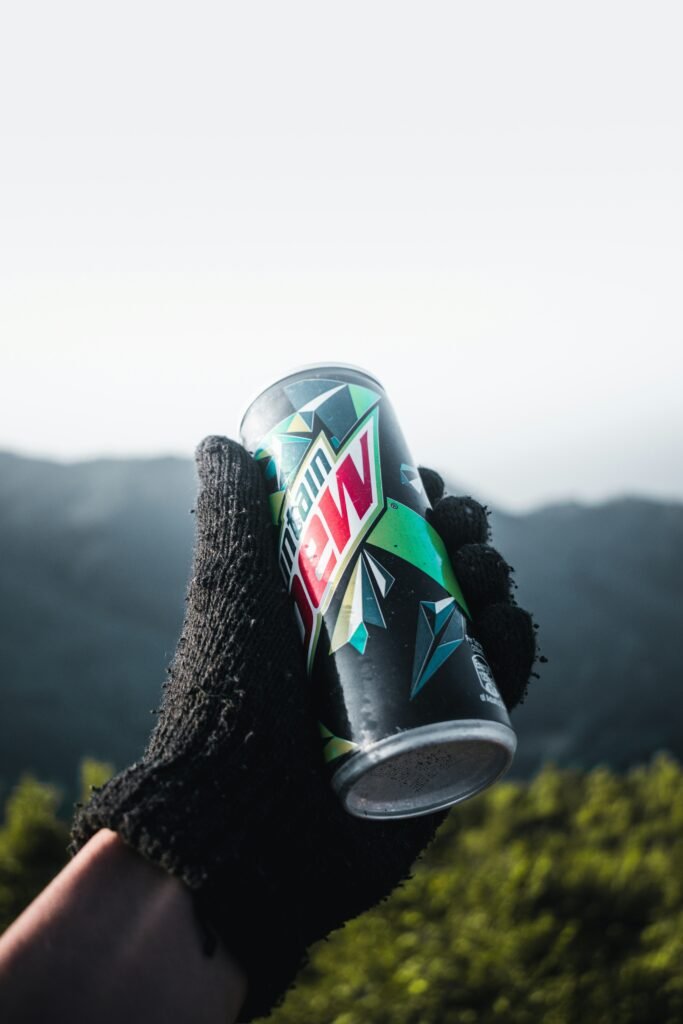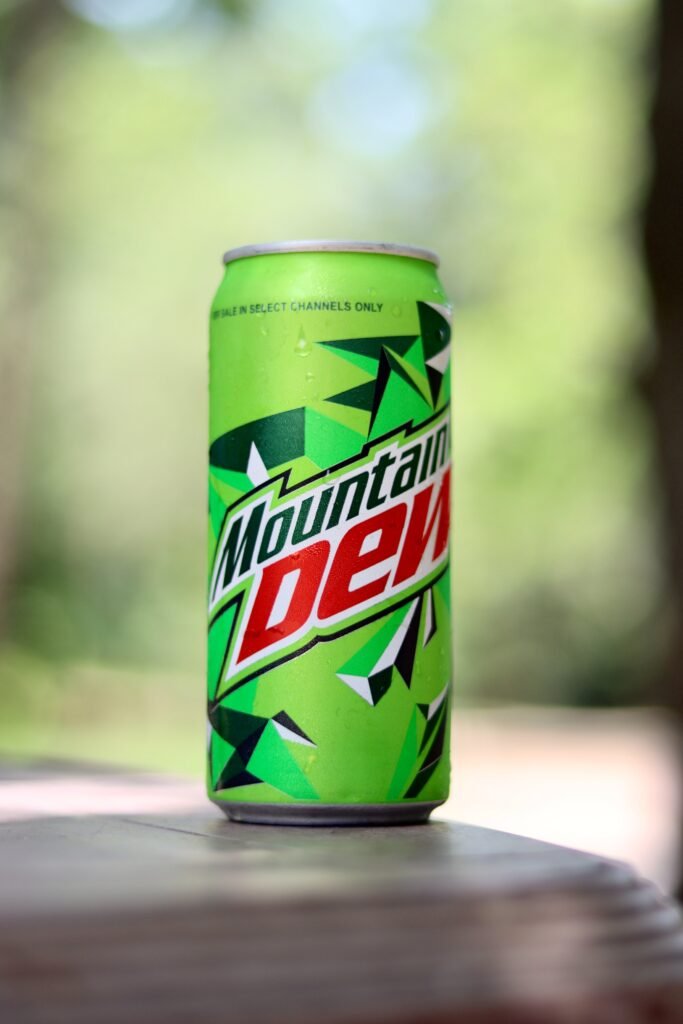Our Location
Islamabad, Pakistan
Although many people still don’t know the ingredients, nutritional value, and other fascinating Nutrition facts Mountain Dew, there’s no doubt how much people adore the beverage. For this reason, we’ve compiled a list of 18 essential Mountain Dew nutrition facts that everyone needs to be aware of. Come along with us as we explore the sweetness and deliciousness of this iconic drink while strolling down memory lane.

Barney and Ally Hartman initially intended Mountain Dew to be a whiskey mixer when they produced it in the 1940s. Moonshine is known by the colloquial nickname “Mountain Dew.”
| Nutrition Facts |
| Serving Size 1 can (12oz) |
| Amount per serving Calories 170 |
| % Daily Values* |
| Total Fat 0.00g 0% |
| Saturated Fat 0.000g 0% |
| Trans Fat 0.000g |
| Polyunsaturated fat 0.000g |
| Monounsaturated fat 0.000g |
| Cholesterol 0mg 0% |
| Sodium 65mg 3% |
| Total carbohydrate 46.00g 17% |
| Dietary fiber 0.0g 0% |
| Sugars 46.00g |
| Includes 46.00g added sugars 92% |
| Protein 0.00g |
| Vitamin D – |
| Calcium – |
| Iron – |
| Potassium – |
| *A food’s percentage Daily Value (DV) indicates the amount of a nutrient that a serving of food provides for your daily diet. The recommended daily intake of calories for general nutrition is 2,000. |
| Calories 170 | Fat 0g | Carbs 46g | Protein 0g |

One 12-oz can (12 cans) of Mountain Dew contains 170 calories.
Calorie breakdown: 100% carbohydrates, 0% protein, and 0% fat.
| High in Calories | With about 170 calories in a 12-ounce (355 ml) serving, Mountain Dew is a calorically loaded beverage. If high-calorie drinks are not balanced with exercise and a nutritious diet, they may cause weight gain. |
| Significant Sugar Content | A 12-ounce serving of Mountain Dew has around 46 grams of added sugar, which is a significant amount. Consuming too much sugar can raise your chance of developing chronic illnesses including type 2 diabetes and heart disease, as well as cause weight gain and dental damage. |
| Caffeine Content | Caffeine is a common ingredient in Mountain Dew, and it may give you a quick energy boost. There are around 54 milligrams of caffeine in a 12-ounce portion. While most people think that moderate amounts of caffeine are harmless, excessive amounts can have negative consequences including jitters, elevated heart rate, and disturbed sleep. |
| Presence of Artificial Colors | The unique color of Mountain Dew is a result of artificial colorings like Yellow 5 (tartrazine) and Yellow 6 (sunset yellow). Certain individuals may be allergic to certain substances or may have behavioral problems as a result of their sensitivity. |
| Limited Nutritional Value | Mountain Dew offers very little in the way of nourishment. This is because it doesn’t include the necessary vitamins, minerals, and other nutrients that are present in milk, water, or fruit juice, which are better beverage alternatives. |
| Citric Acid | Citric acid, a component in Mountain Dew utilized for tartness and preservation, is present. Drinking phosphoric acid-containing drinks can accelerate the deterioration of dental enamel and the growth of cavities. |
| Sodium Content | Mountain Dew has about 60 mg of salt per 12-ounce drink. Even though this is a little quantity, you should still keep an eye on your total salt intake since too much of it can cause high blood pressure and other health problems. |
| Mountain Dew Diet: A Lower-Calorie Alternative | The original Mountain Dew has more calories than Diet Mountain Dew. Diet Mountain Dew has no added sugar and only 10 calories per 20-ounce drink. But other people might want to avoid it because it is sweetened with artificial sweeteners like aspartame and acesulfame potassium. |
| Mountain Dew Code Red: A Fruit-Flavored Variation | A cherry-flavored version of the original Mountain Dew is called Mountain Dew Code Red. With 170 calories and 46 grams of sugar in a 12-ounce serving, it has a comparable nutritional profile to the original. |
| Mountain Dew Voltage: A Berry-Flavored Option | The drink comes in a raspberry-citrus flavor called Mountain Dew Voltage. It has a similar nutritional profile as the original Mountain Dew, with 170 calories and 46 grams of sugar in a 12-ounce drink. |
| Mountain Dew Kickstart: An Energy Drink Hybrid | The Mountain Dew Kickstart range of energy beverages blends fruit juice, extra caffeine, and the well-known Mountain Dew flavor. It could give you a boost in energy, but it also has artificial substances and extra sweets. |
| Mountain Dew Game Fuel: Designed for Gamers | A beverage called Mountain Dew Game Fuel is targeted at gamers and is said to improve focus and accuracy while playing. Theanine, vitamins A and B, and caffeine have been added. Although it could provide you a quick energy boost, it also has artificial chemicals and additional sweets. |
| Mountain Dew Zero Sugar: A No-Sugar Version | Mountain Dew Zero Sugar is a sugar-free version of the original beverage that has no added sugar and no calories. It is sweetened with artificial sweeteners including aspartame and acesulfame potassium, just as Diet Mountain Dew. |
| Mountain Dew Baja Blast: A Tropical Twist | A beverage called Mountain Dew Game Fuel is targeted at gamers and is said to improve focus and accuracy while playing. Theanine, vitamins A and B, and caffeine have been added. Although it could provide a quick energy boost, it has artificial chemicals and additional sweets. |

Brominated vegetable oil (BVO), a chemical used to maintain tastes in some citrus-flavored drinks, was once present in Mountain Dew. BVO has raised health concerns because of its propensity to build up in bodily tissues and have negative consequences. 2014 saw the parent company of Mountain Dew, PepsiCo, remove BVO from its products in response to consumer complaints. Nonetheless, the BVO-containing original Mountain Dew recipe is still occasionally offered for sale as the “Mountain Dew Throwback” beverage.
PepsiCo, the parent company of Mountain Dew, has improved packaging sustainability and used less energy and water during production to lessen the environmental effects of its products. When choosing a diet, it’s important to consider the wider environmental effects of beverage consumption, such as resource use and plastic waste.
Consuming soft drinks, such as Mountain Dew, has been linked in certain studies to a reduction in bone mineral density. This might be because of the acidity or because milk and other calcium-rich drinks have been replaced in the diet.
Research has shown that regular consumers of Mountain Dew experience weight gain, elevated levels of bad cholesterol, and an increased risk of type 2 diabetes.
The amount of sugar in a 20-ounce bottle of Mountain Dew is 77 grams.
The primary reason why Mountain Dew is inferior to other drinks is its high sugar level.
Mountain Dew is undoubtedly a timeless classic and one of the most widely consumed drinks out there. Customers want to try it again because of its powerful flavors, fun adrenaline rush, and delicious flavor. When you crack open a can of this popular beverage in the future, don’t forget to respect its heritage by savoring every bite!
Now that you know the key nutritional information about this classic carbonated beverage, why not make the most of this knowledge and make an informed decision about your next sweet treat? We hope these 18 crucial nutrition facts Mountain Dew have provided you with some much-needed perspective on one of the nation’s favorite drinks, whether you love it or are just curious about it.